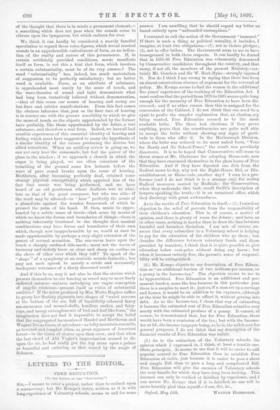LETTERS TO THE EDITOR.
FREE EDUCATION. ION.
ITO THE EDITOR OF THE " SPECTATOR,"1
meant to enter a protest., rather than to embark upon a controversy; but Mr. Kempe's letter, written as it is with long experience of Voluntary schools, seems to call for some answer. I am unwilling that he should regard my letter as based entirely upon "unfounded assumptions."
I ventured to call the action of the Government "immoral."' If there is such a thing as political morality, it includes, I imagine, at least two obligations,—(1), not to violate pledges ; (2), not to offer bribes. The Government seem to me to have transgressed in both these respects. It can hardly be denied that in 1885-86 Free Education was, vehemently denounced. by Conservative candidates throughout the country, and that many, if not all, the members of the present Ministry—cer- tainly Mr. Goschen and Sir W. Hart-Dyke—strongly opposed it. Nor do I think I am wrong in saying that there has been. an almost ostentatious absence of argument for the reversal of policy. Mr. Kempe seems to find the reason in the additional' five years' experience of the working of the Education Act. I must confess that the period from 1870 to 1885 seems quite long. enough for the necessity of Free Education to have been dis- covered ; and if no other _reason than this is assigned for the conversion of the Cabinet, I do not think that one need be a, cynic to prefer the simpler explanation that, an election cry being wanted, Free Education seemed to be the most. available bribe. The three last elections, if they prove. anything, prove that the constituencies are quite well able to accept the bribe without showing any signs of grati tude to those who offer it. In the Harborough Division, where the bribe was reduced to its moat naked form, " Vote- for Hardy and No School-Pence," the result was peculiarly disastrous. It is to be hoped that Conservatives will cease to- throw stones at Mr. Gladstone for adopting Home-rule, now that they have ensconced themselves in the glass house of Frp Education. And if they have digested one dish from the Radical menu to-day, why not the Eight-Hours Biil, or Dis- establishment, or Home-rule, another day P I own to a pre- ference (and I do not think it is a strange one) for seeing- Radical measures carried by Radicals : the Conservatives, when they undertake this task, recall Swift's description of lawyers speaking the truth,—it is an unnatural office, which, they discharge with great awkwardness.
As to the merits of Free Education in itself,—(1), I raised an objection to the relief of parents from the responsibility of their children's education. This is, of course, a matter of opinion, and there is plenty of room for debate ; and here, as in other cases, nothing is harder than to draw the line between harmful and harmless Socialism. I am not, of course, un- aware that every subscriber to a Voluntary school is helping to pay for the education of the children who go there ; but (besides the difference between voluntary funds and those provided by taxation), I think that it is quite possible to give education below cost-price without doing any harm ; but when it becomes entirely free, the parent's sense of responsi- bility will be extinguished.
(2.) Mr. Kempe objects to my description of Free Educa- tion as "an additional burden of two millions per annum, or a penny in the Income-tax." The objection seems to me to- be hypercritical. Free Education is an additional and per- mauent burden, none the less because in this particular year there is a surplus to meet it ; just as, if a man set up a carriage and horses, it would he an addition to his expenses, although at the time he might be able to afford it, without getting into- debt. As to the Income-tax, I chose that way of eatimating it because the estimated cost of Free Education coincides very nearly with the estimated produce of a penny. It cannot, of course, be demonstrated that, but for Free Education, there would have been a remission of the tax ; but with the Income- tax at 6d., the income-taxpayer being, as he is, the mikh-cow for general purposes, I do not think that my description of the financial results of Free Education was unfair.
(3.) As to the extinction of the Voluntary schools, the opinion which I expressed is, I think, at least a tenable one. Obsta principiis. It seems to me that it will be easier to add popular control to Free Education than to establish Free Education ab initio, just because it is easier to pass a short and simple Bill than to pass a long and complicated Bill. Free Education will give the enemies of Voluntary schools the very handle for which they have long been looking. This forecast can only be verified or falsified by experience, and I can assure Mr. Kempe that if it is. falsified, no one will be more heartily glad than myself.—I am, Sir, &c.,


































 Previous page
Previous page